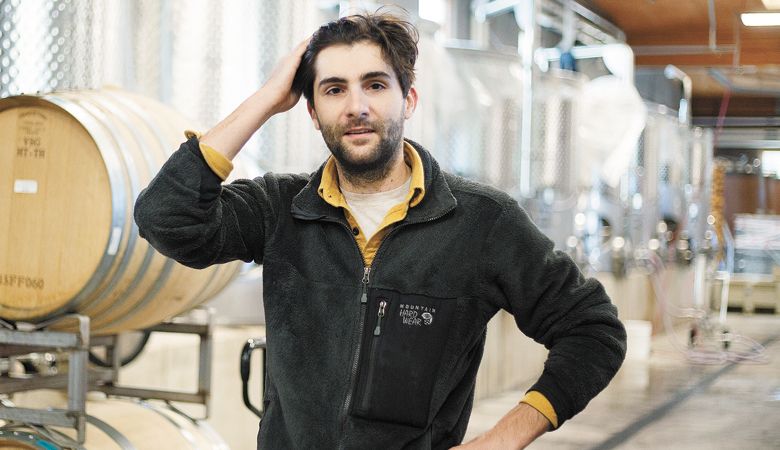Q&A: Alban Debeaulieu
French-born Oregon winemaker
Born outside Paris, winemaker Alban Debeaulieu grew up in Southern France in a family and landscape surround by wine. He studied agronomics and viticulture in French Catalonia before moving to Burgundy to pursue his studies. There, he lived in both Dijon and Beaune while completing a bachelor’s and master’s in winemaking and enology at Université de Bourgogne while working harvests in Beaujolais, as well as the 2012 harvest at Maison Joseph Drouhin in Beaune. In 2013, Debeaulieu moved to west to work harvest at Domaine Drouhin Oregon, then took a position as assistant winemaker at White Rose Estate. In 2016, Debeaulieu joined 00 Wines and Chapter 24 Vineyards as winemaker before arriving at Abbott Claim in May 2017.
What is your family’s history when it comes to winemaking/growing?
AD: My parents and grandparents did not own a winery. Growing up in the Rhône Valley and visiting my grandparents in the Loire Valley and Atlantic Coast every summer, wine was always around though. I’d visit cellars in Chinon, around the Touraine and Saumurois, with my maternal grandfather when staying there for the summer, help him bottle some shiners in his cellar sometimes. Or I would help with the few rows of vines my paternal grandfather had in Vendée, which gave him a few barrels’ worth of wine for personal consumption, just like he grew his garden or made eau de vie. Grape growing was just like gardening, and wine was like food.
What is your philosophy in the vineyard? In the cellar?
AD: We make wine the same way we grow grapes, with the very same intentions and philosophy, since it is, or should be, one continuous, uninterrupted process. It starts by recognizing what matters, and to me it has to be the land, its personality and idiosyncrasies; there is nothing more fundamental to what we do as a winery than the piece of land where vines grow, and their mutual interactions. Our farming and winemaking are just there to translate that information rather than manufacture a stylistic product in our image. So, our work is gentle and, hopefully, thoughtful. In the vineyard, organic viticulture is a minimum, a baseline on which we can layer some elements of Biodynamics like tisanes and compost, and regenerative agriculture with an emphasis on soil life. If we believe in our terroir and can provide the vines with as much of a rich, complex and balanced environment in which to thrive, the work in the winery is to simply further this process with transparency: healthy, natural acidity, strictly native fermentations, delicate extractions, slow sur-lie aging in a cold, damp cellar until bottling, ideally without fining or filtration, while paying attention to the lunar and tidal calendars for the most critical aspects of the work. This is all very traditional; there is no dogma, just hoping to produce wines that I enjoy drinking, that speak of place and are for the ages.
What excites you about making wine in Oregon?
AD: The fact that there’s so much yet to be done. Fantastic wines have been made in the last few decades, and today feels like an inflection point where we need to learn from and carry on those achievements into this new environmental and economic paradigm. Constantly re-discovering the vineyards, how to better farm them, how to make wines that are meaningful, and ultimately how to position ourselves in this complex equation. Coming from France, there is also the rare and exciting opportunity of exploring new terroirs, planting young vineyards through the lens of resiliency and ecology, making sure the work we do remains meaningful for much longer than I can make wine.
What do you miss most about France?
AD: Family and friends. The food. Health insurance.
Any pleasant surprises about America?
AD: Many! It gave me an amazing family, that’s a big one I hadn’t planned on. I also feel incredibly grateful to have made some amazing friends here, I know some of those friendships will count for a long time. Finally, the opportunities given to me to do some exciting work since landing here some years ago; I am very thankful that a few winery owners were bold enough to trust me early on, France wouldn’t have allowed for that.











